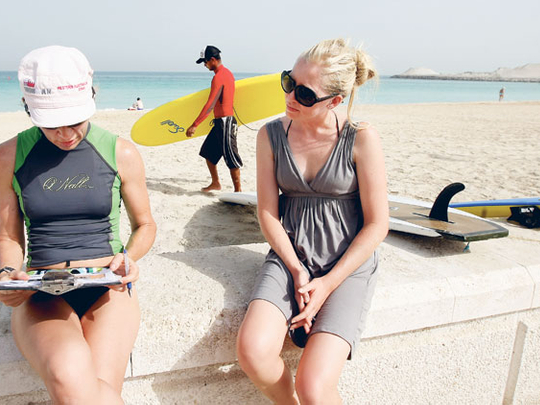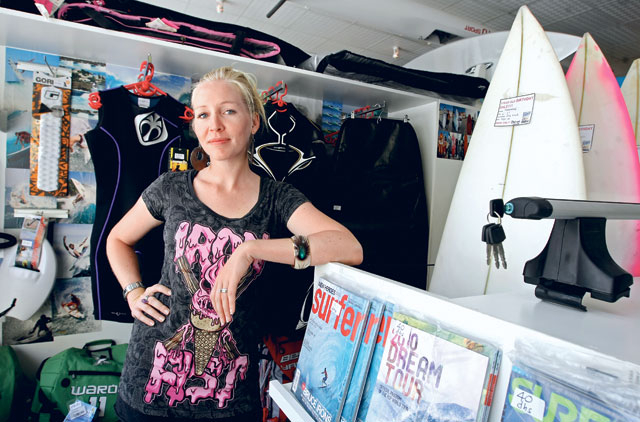
Dubai: The small shop looks like what most people think of as a "typical" surf shop. There are pictures on the wall of surfers in exotic locales, there are classic surf movies on the TV, and the racks are filled with surfboards and wetsuits.
But this shop isn't located in South Africa or near Hawaii's North Shore, it's in Al Barsha.
The Surf Shop Dubai is the product of Carl and Mari De Villiers and their friend Mohammad Rahma, a trio of surfers who decided to turn their love of the sport into a commercial venture.
"Most people are amazed because they're like, wow, there's a surf shop here," said Carl De Villiers. "If you look at a map of the world of surfing equipment and gear, there's this black hole in the Middle East. There's nothing going here."
He says it is the only specialised surf shop in the Middle East.
The De Villiers, who are originally from Cape Town, South Africa, first opened a shop in International City in April 2009. They had just returned from their honeymoon and Mari had lost her marketing job when the store opened.
Carl says the idea behind the shop wasn't to make money, but to service Dubai's small, but growing, community of surfers. However, having a surf shop so far from the beach was a problem.
Difficult location
"It was difficult in terms of location," he said. "The location didn't help us at all. We took about 10 customers a week … But guys knew that if they needed a surfboard or surf equipment we had them."
The downturn that had cost Mari her job in 2008 also provided a silver lining. Carl says that falling rents around the emirate allowed them to move to Al Barsha. They are now only a couple of minutes from the beach.
The move from a free-zone to Dubai offered new problems, which were helped by the addition of Rahma. Carl met Rahma when the latter was recovering from a rugby injury and rehabbing at the beach. Rahma approached Carl when he saw him teaching a surfing class, and Carl decided to teach the Emirati how to surf. After the two became friends, he approached Rahma about a business partnership.
Rahma said the prospect of doing something new and different appealed to him.
"Most successful businesses are those that bring out things that no one else has," he said. "I know there are other places that sell surf boards, but not as a dedicated surf shop."
The trio, none of whom had run a business before, moved into their current location on January 1.
Rahma has experience helping his father with his stores, but said the venture still posed some risks.
"It is risky, but … I love to take risks and do things that are challenging."
The process of opening a small store in Dubai was tedious, they said.
"We had to go down to the government offices about three to four times a week to deal with paperwork and other issues. That's something I wouldn't want to do again," Mari said.
After going through the red tape to get their business licence, they still had difficulty getting a corporate account at a local bank. The minimum balance requirements in 2008 were prohibitive, they say.
"Banking was very difficult," Karl said. "Initially, we went to all the banks here and you had to have a minimum balance of Dh20,000, which is just ridiculous for a small business to hold that kind of cash flow all the time. You're investing your money in your stock and stuff like that."
Getting stock in the store also presented a challenge. The shop gets in surfboards and other merchandise from China, which brings with it a heavy shipping cost. Besides the cost of the boards, shipping 20 boards from China can cost Dh3,000 to ship and an additional Dh5,000 to clear customs at Jebel Ali.
Constant struggle
Carl says they also try to avoid clothing unless they have something original, since while the boards and other surfing gear might be unique, they are constantly in competition with other stores in prime mall locations and can't afford to buy in bulk.
"I think we burnt our fingers on clothing," he said. "We struggled because we were dealing with large corporations who charged Dh40,000 and wanted to be paid up front."
Carl said he would like to see greater support for small businesses in Dubai, where the focus is on big business.
"They're not interested in small business and guys like us, who start small and might grow."
Even though he has gone through the proper channels to set up a business, he says he is still undercut by unlicensed merchants with cheap products.
"We like to do legitimate business, so we have our trade licence and premises," he said. "What happens is there are a lot of guys who trade under the radar, out of the backyards or out of their houses. It's a big problem here."
Despite the struggles of building a small business in Dubai, all three say they enjoy what they do and the effort has been worth it.
"It's been a really good time for us because we've been able to work together, but it's also been a time of learning to build a small business," Mari said.
The store's future seems good. The shop's South African distributor has acquired the right to some new brands, which means a wider variety of items in the shop. The store, Mari says, it now "paying for itself". But Carl says the ultimate measure of success isn't how much money the store brings in.
"Long term, once the foundation is built, maybe it will start to make money in terms off paying salaries and thing like that, but success is measured in looking at what we've achieved," he said. "We managed to create a market here and service a community."













